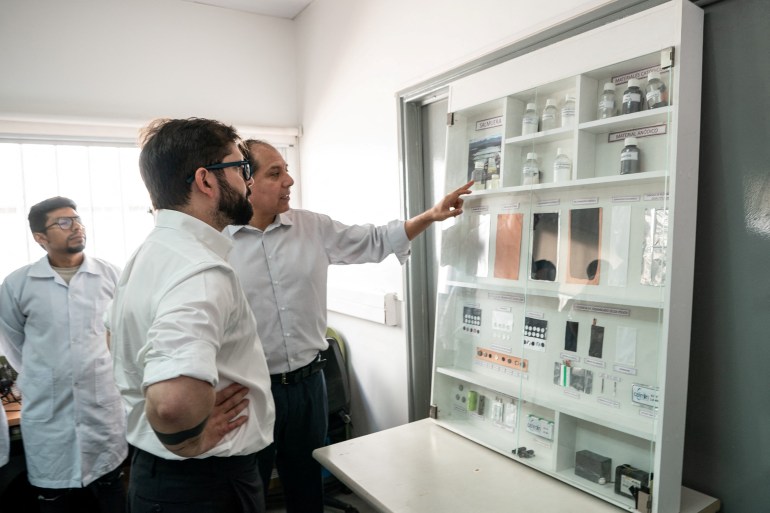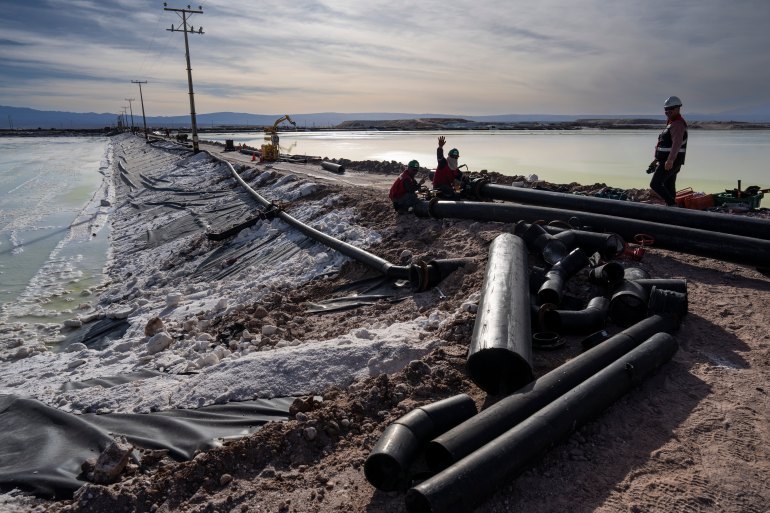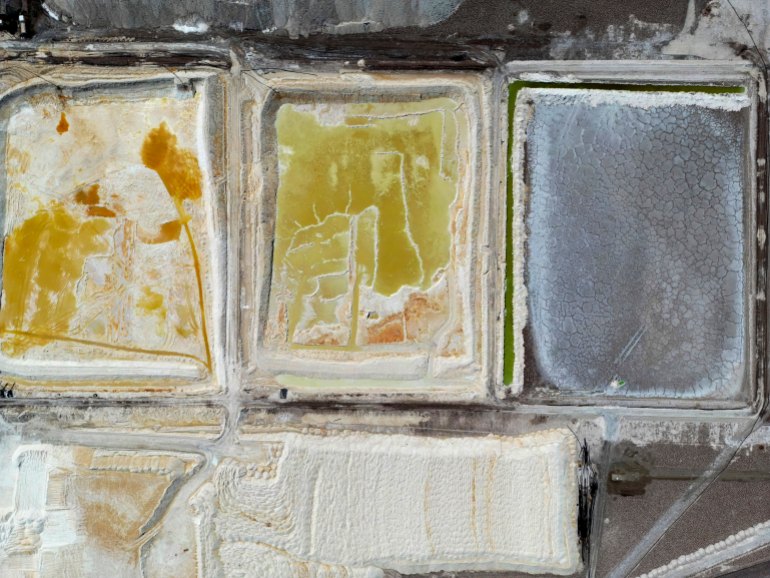Chile bets on becoming world lithium leader as demand rises
President Gabriel Boric’s programme to exert state control over lithium production sparks conservative backlash.

Santiago, Chile – It’s white — not yellow — but like gold, lithium has rapidly become one of the most sought-after precious metals on earth. Theoretically you can find it almost anywhere, but in practice lithium is best extracted from salt flats.
This explains why lithium fever is spreading throughout what is known as the lithium triangle, the salt flats of Chile and neighbouring Bolivia and Argentina. According to World Economic Forum, they account for around 60 percent of the world’s known lithium reserves. Of the three, Chile is currently the largest producer.
Keep reading
list of 3 itemsChilean Congress approves bill reducing work week to 40 hours
Will a ‘quick trigger’ law keep Chile safe?
Driven by the global green energy transition, last year the price of the light, salt-like metal used for batteries in electric vehicles and mobile phones jumped from $14,000 a tonne to over $80,000 in November. And while prices have come down to less stratospheric levels, some estimates predict a 40-fold increase in demand for lithium by 2040.
That is why Chile’s President Gabriel Boric sent shock waves through the new energy metals sector when, in a nationally televised prime-time address on April 20, he announced his keenly anticipated National Lithium Programme.
It calls for the creation of a state-run lithium company that will promote, expand and control the country’s industry. (Chile is already the world’s second-largest producer after Australia.)

“We want Chile to become the world’s leading producer of lithium, while protecting the biodiversity of the salt flats,” said Boric. “This is the best chance we have at transitioning to a sustainable and developed economy.”
Boric said the state will control 50.01 percent of shares in joint ventures with private investors. Current contracts will be respected, but new ones will have to agree to terms that include using state-of-the-art technology to reduce or eliminate environmental damage, better conditions for workers and consulting mainly Indigenous local communities in the Atacama Desert region, so that they too can benefit from the extraction of lithium.
“How is it possible that the people that live in the regions that produce the country’s greatest wealth are at the same time the poorest in the country?” Boric asked.
The plan includes the creation of a national lithium institute to identify ways to identify and produce value-added derivatives.
For example, Chile “can already produce lithium carbonate and lithium hydroxide”, said Jose Miguel Benavente, vice president of CORFO, Chile’s economic development agency, referencing two compounds used to make batteries for electric vehicles. But, he told Al Jazeera, refining the lithium further can increase the element’s worth: “After extracting lithium chloride, each additional process or product increases its value by approximately 15 percent, which is no small amount.”

The Chilean government announcement has been met with mixed reviews, especially inside Chile, where conservative politicians accused the left-wing president of trying to turn the clock back to the days of former socialist President Salvador Allende, who was overthrown in 1973 in a military coup. Allende nationalised Chile’s copper industry, today the world’s largest.
Immediately global headlines announced that Boric was “nationalising” Chile’s lithium. But in fact, unlike copper, the constitution already defines lithium as a strategic and exclusively state-owned mineral, because of its possible use in nuclear fusion.
Boric acknowledged that the private sector and many conservative economists may be wary of his plan.
“I could have just let things remain as they were and not do anything, and that way avoided problems. But I don’t think that is the best way to govern. We have one goal and that is to generate wellbeing for the people of Chile,” Boric said Monday at an International Mining Fair.
Boric’s ambitious social programmes need financing, and lithium is clearly the new white gold.
For decades the state has awarded generous concessions to private companies, such as the world’s largest lithium producer, Albemarle Corporation, which operates in the giant Atacama Salt Flats in partnership with the second biggest producer, Sociedad Química y Minera de Chile (SQM). SQM’s contract expires in 2030. The shares of both companies fell with the news that they will have to relinquish their majority control, if and when they get their contracts renewed.
Commenting on Chile’s new policy, Tesla CEO Elon Musk tweeted: “Lithium ore is very common throughout Earth. What matters is refining capacity.” He is not wrong. Not all lithium is made equal. Know-how and technology are important, but so too is the source of the lithium.

“You can take lithium out of the ocean, but it is very, very expensive,” said Benavente. “We have a great advantage over Italy, the United States and Australia that produce lithium from rocks, because we can literally just grab it. Of course it’s more complex, but in relative terms, it is much easier and far more cost-efficient — and therefore profitable — to extract lithium from salt flats in the desert. You just spread it out and let it dry. Therefore, the profit margin here is much higher than in Australia, which right now produces more but at a far higher cost.”
The government says it will present the final bill to create the national lithium company in the second half of this year. While it is created, CODELCO, the state-owned copper company which is now the world’s largest copper producer, will be in charge of getting the business started. Hundreds of foreign companies interested in investing in Chilean lithium are already showing interest, government sources have told Al Jazeera.
Apart from the Atacama Salt Flats, President Boric says that Chile will open opportunities to private companies to invest in at least a dozen smaller but still significant lagoons and salt flats in other areas.